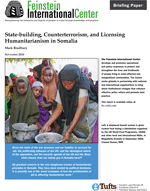The people of Somalia have experienced two decades of humanitarian crisis. In 1992, in the wake of the collapse of the Somali state, Somalia set a benchmark for humanitarian crises in the immediate post-Cold War world, with a war and famine that killed a quarter of a million people and displaced over 3 million more. Two decades later, Somalia once again is being described as one of the worst humanitarian crises in the world, with over 1.5 million people internally displaced and over half a million Somalis living as refugees in neighboring countries. At the same time, as the conflict has increasingly taken on a regional and international dimension access for humanitarian agencies has become extremely restricted.
This new briefing paper explores the policy and operational implications of the current crises and the challenges to humanitarian action in Somalia. It examines how international state-building and counterterrorism objectives in Somalia have compromised the ability of international humanitarian actors to assist and protect vulnerable populations.
The paper is one of several being produced for a major research project on Humanitarian Action and Politics.







